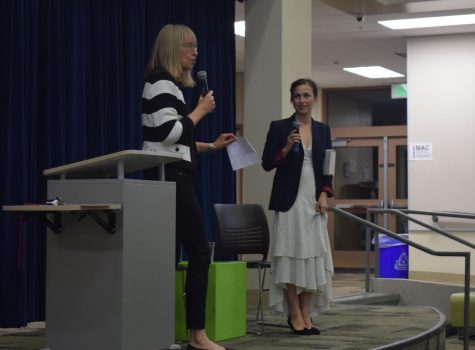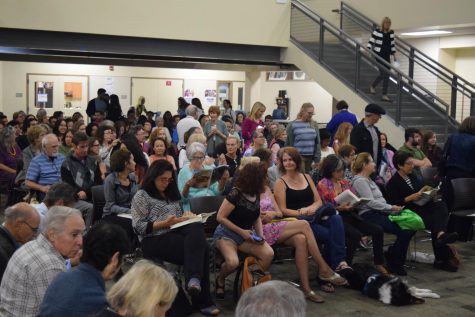Steve Jobs’ daughter talks writing, relationship with father
October 4, 2018

Silence filled the Palo Alto High School Media Arts Center on Wednesday as Lisa Brennan-Jobs talked about her new memoir, “Small Fry,” and discussed her relationship with her father, Steve Jobs.
Esther Wojcicki, the co-adviser of The Campanile, and Books Inc., a Bay Area bookstore, organized the presentation. The event was a fundraiser for the Paly MAC Boosters.
“When I discovered that Books Incorporated was going to have a reading, and that they might not have enough room for everybody in Books Incorporated, I said, ‘my god, we’ve got this beautiful building [the Media Arts Center] here, why don’t we make use of that beautiful building?’” Wojcicki said.
Brennan-Jobs, a Paly alumna, began the presentation by discussing the writing process for “Small Fry,” saying that, at first, it was an uphill battle.
“While I was writing it, at least in the beginning, I was having trouble finding my own character in the pages,” Brennan-Jobs said. “I would write a scene about something that happened, and someone else would read it and say, it’s interesting, but where are you?”
Brennan-Jobs said the writing process took much longer than she initially expected.
“It took more than seven years. I was saying seven, but it took more than that,” Brennan-Jobs said. “I did other things during that time, but mainly I worked on this book, and the problem was, not only did I not know what the story would be … I also didn’t know what the perspective was, and the sentences were really bad.”
Brennan-Jobs said that she was eventually able to become present in the story by including experiences that she was ashamed or embarassed of in her memoir.
“I guess instead of hiding all this stuff, I need to kind of understand all the places where I did shameful, devious things, and then I need to bring them out into the light,” Brennan-Jobs said. “That became a way to kind of unlock the book for myself, because when I could find the ways that I was ashamed of things I’d done, then I found myself on the pages.”

Brennan-Jobs also said that the act of writing helped bring out old memories.
“I would remember something, and then it would remind me of something else,” Brennan-Jobs said. “And somehow the writing seemed to flesh out the memories.”
One of the themes of “Small Fry” is the experience of living in Steve Jobs’ shadow, according to Brennan-Jobs.
“One of major ones was, ‘do I have the right to exist?’ Which I think was a big question for me,” Brennan-Jobs said. “Do I have the right to take up space with my own story, especially given the fact that I have this famous father and it seems presumptuous of me to write a memoir when my story is little, in many ways, compared to his?”
When Brennan-Jobs was born to Chrisann Brennan in 1978, Jobs initially denied that he was the father, and continued to do so even after a paternity test established that he was, according to an article published by Business Insider.
As a result, according to a New York Times article, Brennan-Jobs lived with her mother for most of her childhood and only moved in with her father during for some time in high school.
Brennan-Jobs described feeling as a teenager that her father owed her things, like furniture, because of his absence in her youth.
“It became a sort of focus for what was a much larger subject, which was that I was very hurt that he hadn’t been around when I was younger,” Brennan-Jobs said. “And that hurt found itself in many different pieces of furniture and other things … some of it had just become a place for me to put my sorrow, sorrow that I didn’t comprehend even then.”
She often moved back and forth between her mother’s house and her father’s house, describing the transition as a “culture clash.”
“At my father’s house, I wasn’t so high up on the totem pole, perhaps, or maybe it was just an issue of temperament, it was colder,” Brennan-Jobs said. “So I would get used to my father’s house, and maybe have a bit of armor to deal with it. And then I would go back to my mother’s house maybe a week or two weeks later or a month later, and there would be a kind of thaw, because she would be kind of totally doting and adoring me.”
Despite this experience, Brennan-Jobs said that the “creative side” of Jobs was separate from the rude or harsh way he has been portrayed in popular media.
“This is like my public service announcement to the Bay Area, which I’m not sure if I have a right to say, but I’ll say it,” Brennan-Jobs said. “The experience I had with the creative part of my father was positive, delightful, kind, caring, very sensitive, and curious.”
Although Brennan-Jobs is clear in her book about her father’s “sharp” and “brash” demeanor at times, she also emphasizes the tender moments with him.
“In my book, there are moments of such tenderness and sweetness. … There was a scene [in the book] where we’re in Hawaii, and I think he was pointing out different body parts, like, ‘hey, look, you and I have the same nose,’ and I didn’t know it at the time but he was basically saying, ‘look, we’re related,’” Brennan-Jobs said.
For Brennan- Jobs, the experience of writing a memoir has been freeing.
“I do feel like I’m occupying space in a different way than I did when I started it [‘Small Fry’], and that I’m not running as fast from something, and that I don’t feel embarrassed about myself.”
Since its release, “Small Fry” has often been publicized as a story about her father Brennan-Jobs said. She, however, was quick to clarify that her memoir is actually a young girl’s coming of age story. Brennan-Jobs said she at times has worried that readers will feel disappointed that the story is not so much about her father as it is about herself.
“I’ve just been hoping that at least some people who buy this book reading the headlines that it’s all about Steve Jobs will pick it up and read a coming of age story about a girl,” Brennan-Jobs said. “And maybe they’ll like it.”



